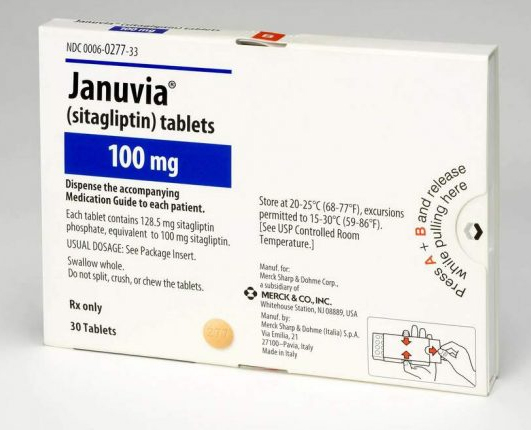
Information
Januvia (sitagliptin) is a prescription medication approved to treat type 2 diabetes. It is used along with diet and exercise to lower blood sugar levels in people whose diabetes cannot be controlled by diet and exercise alone. Januvia belongs to a class of drugs called dipeptidyl peptidase-4 (DPP-4) inhibitors, which work by increasing the levels of natural substances called incretins. According to clinical studies, Januvia reduces HbA1c significantly more than does placebo or other antidiabetic medications when added to a variety of other treatments.
Januvia (sitagliptin), a drug used to control blood sugar in people with type 2 diabetes, lowers HbA1C without causing excessively low blood sugar levels.
Sitagliptin is indicated for use with diet and exercise to improve glycemic control in adults with type 2 diabetes mellitus. Sitagliptin increases the levels of natural substances called incretins, which may help restore your body’s ability to make insulin and control your blood glucose level.
Januvia works by increasing levels of natural substances called incretins. Incretins help to control sugar by increasing insulin release, especially after a meal. They also decrease the amount of sugar your liver makes.
Januvia was FDA-approved in 2006 as an add-on treatment for type 2 diabetes, along with diet and exercise.
Januvia is an antidiabetic drug used to treat type 2 diabetes. It’s a member of the class of drugs known as dipeptidyl peptidase-4 (DPP-4) inhibitors and can be used alone or in combination with other medications. Januvia was FDA-approved in 2006 as an add-on treatment for type 2 diabetes, along with diet and exercise.
It’s important to note that Januvia should not be used as a monotherapy; rather, it works best when combined with other medications like insulin therapy. Also, because Januvia is a DPP-4 inhibitor, it is not recommended for people who suffer from type 1 diabetes (the kind caused by autoimmune destruction of pancreatic beta cells).
According to clinical studies, Januvia reduced HbA1c significantly more than did placebo or other antidiabetic medications when added to a variety of other treatments.
Januvia (sodium-glucose cotransporter 2 inhibitor) is a medication that lowers blood sugar levels. It’s used to treat type 2 diabetes.
It’s important to keep your blood sugar levels under control for the best health possible. With type 2 diabetes, your body does not use insulin properly and cannot make enough of it on its own. As a result, your blood sugar level becomes too high and can cause serious health problems over time if left untreated—including heart disease, blindness, kidney failure and amputation of limbs due to poor circulation (foot). Januvia helps control these problems by helping the pancreas produce more insulin while also reducing how much glucose enters the bloodstream after eating food or drinking sugary beverages like sodas or juices (most people eat three meals per day plus snacks throughout their waking hours).
The most common side effects of Januvia are upper respiratory tract infections and headache.
These symptoms usually occur during the first few weeks of treatment and subside after a few months.
Take your medication as directed to help prevent side effects from happening. If any problems occur, consult your doctor or pharmacist for advice.
Tell your healthcare provider if you experience any worrisome changes in mood or behavior that last for more than two weeks while taking Januvia
There have been reports of acute pancreatitis in patients taking Januvia, although there is no conclusive evidence that Januvia causes pancreatitis. Some patients have reported severe joint pain while taking the drug, but this is rare. As with all antidiabetic drugs, some patients may experience hypoglycemia (low blood sugar).
Pancreatitis is a serious condition that can be fatal. It can occur in patients with existing conditions, such as diabetes, or in patients who have not previously experienced problems with their pancreas. Januvia is associated with an increased risk of pancreatitis and has been linked to multiple cases of the disorder. However, there is no conclusive evidence that Januvia causes pancreatitis itself; there’s simply a correlation between taking the drug and developing pancreatitis symptoms.
In addition to acute pancreatitis, some patients have reported severe joint pain while taking Januvia (and other medications like it), but this is rare. As with all antidiabetic drugs, some patients may experience hypoglycemia (low blood sugar).
Januvia is a drug used to treat type 2 diabetes. It is a tablet that people take once daily and can be used alone or with other antidiabetic medications. It is taken openly (without food) on an empty stomach with or without water, approximately 30 minutes before eating.
Januvia can be used by patients who have not been able to control their blood sugar levels with diet and exercise alone, or in combination with other antidiabetic drugs such as insulin or metformin.
Conclusion
In conclusion, Januvia belongs to a promising new class of diabetes drugs. This drug is useful for treating type 2 diabetes and may also be useful as a treatment for obesity. It has not yet been approved by the FDA for use in people with type 1 diabetes or those with prediabetes, but clinical trials are underway to test its efficacy in these populations.
WE CAN HELP YOU SAVE HUNDREDS A MONTH AND THOUSANDS A YEAR ON YOUR MEDICATIONS
Med Home Assist To Get Enrolled In Prescription Patient Assistance Now.


